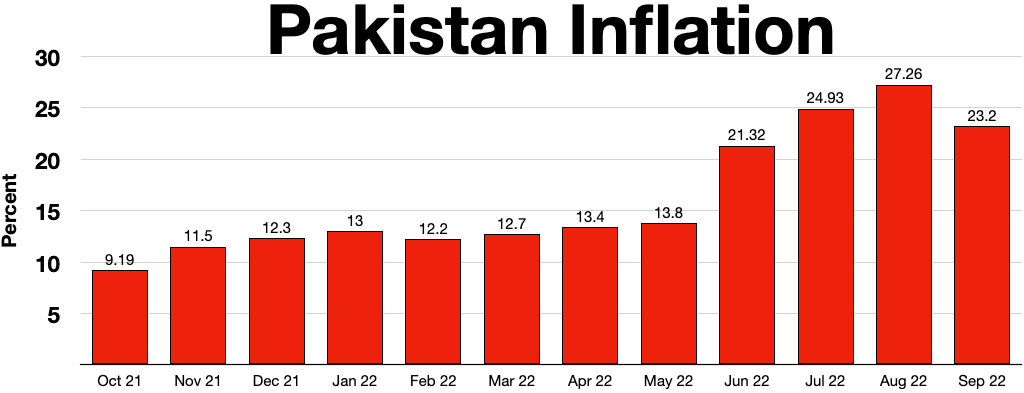Economic Crisis in Pakistan
February 4, 2023 | Expert Insights

Pakistan is today facing a perfect storm of economic and political crises. But this is not a situation which has developed in a single day. All this is taking place due to years of economic and political mismanagement by successive Pakistani governments.
Background
The crisis began under the previous government of Imran Khan when the prices of essential goods were raised to earn the extra revenue to pay off Chinese debts.
Such an economically unsound move would not have succeeded in the best of times. And for Pakistan the litany of disasters was just beginning.
First the IMF suspended its bailout package to Islamabad in 2020 due to its lack of credit worthiness on earlier loans. Secondly the Covid-19 pandemic and the subsequent lockdowns hit the country hard. In June 2022 massive flooding damaged large parts of the agricultural area of the country. The ensuing relief efforts proved to be too much for the government budget to handle on its own. Russia’s invasion of Ukraine in February 2022 put huge pressure on global food and energy prices which affected Pakistan’s economy adversely. And finally, there was the political instability which led to the collapse of Imran Khan’s government.

Analysis
There is no single cause to the present economic crisis in Pakistan and as a result there is no silver bullet out there as a solution.
Historically Pakistan has always stood up its economy by tying itself up with other powerful economies. During the Cold War it was the United States and later on, it was China. Under the banner of Islamic solidarity, it has sought economic assistance from Arab energy giants like Saudi Arabia as well as from the smaller Gulf emirates.
This policy worked quite well as long as Pakistan was a strategically important state for these countries. So, all these donor countries were willing to overlook the fact that the Pakistani economy was completely dependent on their loans. They were eager to forget the uncomfortable truth that they were not getting much economic returns for their financial assistance. But today the tables have really turned in this regard.
Pakistan is no longer on the front line of any major geo-political conflict with the war in Afghanistan ending. So, there is no strategic imperative for foreign powers to prop up the Pakistani economy anymore.
This being said the present crisis is largely a self-inflicted wound by the Pakistani elite. This has been coupled by the inherent structural weakness of the Pakistani economy.
Pakistan’s economy is still dependent on a few sectors like the textile sector and a few agricultural crops like rice, sugarcane and cotton. Apart from this it is mostly dependent on remittances from Pakistani expatriate workers who work in the Gulf Arab states. Pakistan has not been able to diversify its economy to adapt it with changing times.
To compound all this the military sector has always eaten up huge portion of Pakistan’s GDP. This has left very little money for other parts of the economy. The civilian economy has always been beset by perennial problems like corruption and cronyism which have never been addressed head on by any government due to vested interests.
So, when China’s Belt and Road Initiative (BRI) came up the Pakistani authorities thought that this would be another golden opportunity to milk outside assistance. But in the end, they had badly miscalculated in their assessment. The strict conditionalities which the Chinese government set under the BRI project proved to be too much for the Pakistani authorities to handle. As a result, in the end Imran Khan had to punish Pakistani taxpayers to pay back the Chinese loans.
Even traditional allies like Saudi Arabia are no longer willing to give economic freebies to Pakistan carte blanche on the basis of Islamic brotherhood. Which brings us back to the present crisis. Even now the Shehbaz Sharif government is blaming the IMF for its inability to fund a military response to the Taliban insurgency which has come back in the Pashtun heartland of the country. The Pakistani government is trying to play hardball with the IMF to get the loan it needs. But this has proved to be counter-productive and has backfired on Islamabad in a very bad way. The plan which Pakistan had put forward to the IMF to manage its debt has failed to impress the international donor. The IMF above all wants a transparent and accountable economic system in Pakistan. The Pakistani government has yet to put forward any plans to the Fund in this regard. No country can bully its way into getting an IMF loan no matter how serious the situation.
For India the threats from a Pakistani economy spiralling out of control are multiple. First there is the contagion effect from the economic crisis in Pakistan. Second the Pakistani elite might try to manufacture hostilities with India to divert the public’s attention from the domestic financial troubles. Third Indian exports to Pakistan might get impacted. Finally Chinese influence in Pakistan could actually increase if Islamabad does not receive assistance from anywhere else and the crisis worsens. Therefore, India has to take all these eventualities into consideration.
Assessment
- A loan from the IMF alone will not be able to save Pakistan’s economy from the present crisis.
- Major structural reforms are needed in the Pakistani economy to provide long term solutions to its problems.
- The huge allocation of resources to the Pakistani defence sector needs to be reduced to balance the economy.
- If Pakistan stops its terrorism based foreign policy towards India then the resulting benefits could even help it revive its economy.








Comments